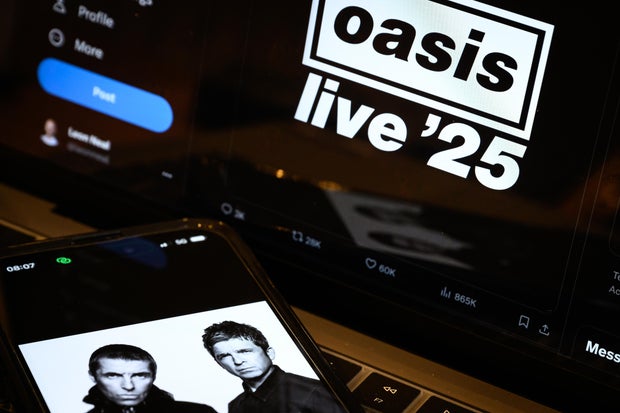CBS News
Oasis announces North America reunion tour dates for 2025: “One last chance to prove that you loved us”

After ending a 15-year hiatus – and long-held feud between brothers Liam and Noel Gallagher – Oasis shocked fans by announcing a reunion tour last month. The band announced Monday they are taking the long-awaited tour to North America in 2025.
“America. Oasis is coming. You have one last chance to prove that you loved us all along,” the Britpop band said in a statement.
There are five new stadium dates for next summer in Toronto, Chicago, New Jersey, Los Angeles and Mexico City. American rock band Cage the Elephant will open.
Presale registration is currently open on the band’s website until Tuesday at 8 a.m. ET. The general ticket sale will begin on Friday at noon local time via Ticketmaster.
/ AP
According to a press release, the band will also tour other continents outside of Europe and North America later next year.
Last month, frustrated Oasis fans in the U.K. were met with error messages, hourslong online queues and dynamic pricing – the quick rise and drop of price due to demand – while they attempted to score tickets.
There may be a solution for at least one of those issues: a spokesperson for Oasis management shared in a statement Monday that “Ticketmaster’s dynamic pricing model will not be applied to the forthcoming sale of tickets to Oasis concerts in North America.”
“When unprecedented ticket demand (where the entire tour could be sold many times over at the moment tickets go on sale) is combined with technology that cannot cope with that demand, it becomes less effective and can lead to an unacceptable experience for fans,” it continued. “We have made this decision for the North America tour to hopefully avoid a repeat of the issues fans in the UK and Ireland experienced recently.”
Band’s break up and reunion
Formed in Manchester in 1991, Oasis was one of the most dominant British acts of the 1990s, releasing hits like “Wonderwall” and “Don’t Look Back in Anger.” Its sound was fueled by singalong rock choruses and the combustible chemistry between guitarist-songwriter Noel and singer-sibling Liam.
The group split in 2009 after many years of infighting. Noel Gallagher officially left the band just before a performance at a festival near Paris. Even before the dissolution, the two brothers had long had an antagonistic relationship.
“People will write and say what they like, but I simply could not go on working with Liam a day longer,” Noel Gallagher, the band’s guitarist and songwriter, wrote in a statement at the time.
While the Gallagher brothers haven’t performed together since both regularly performed Oasis songs at their solo gigs.
LEON NEAL / Getty Images
Last month, the Britpop progenitors ended a few days of fan speculation of an upcoming reunion. A short video on the band’s social media accounts Sunday night had revealed the date “27.08.24,” and time “8 a.m.,” written in the same font as the well-known Oasis logo. The brothers shared the same to their individual accounts.
Announcing the reunion, the band said fans would experience “the spark and intensity” that occurs only when they appear on stage together.
Oasis’ North American tour dates
Aug. 24: Toronto
Aug. 28: Chicago
Aug. 31: East Rutherford, New Jersey
Sept. 6: Los Angeles
Sept. 12: Mexico City
CBS News
What will happen to home equity loan rates after this week’s Fed rate cut?

Getty Images
Interest rates are on the decline. Or at least the federal funds rate is. That seems to be the confusing but somewhat accurate interpretation in recent weeks after the Federal Reserve issued its first cut to the federal funds rate in more than four years in September. Cut to a range between 4.75% to 5%, the expectation was that rates on borrowing products would soon ease. While mortgage rates did temporarily drop in the month, they rose again by close to a full percentage point in October. And credit card interest rates, admittedly influenced by a complex series of factors besides just the federal funds rate, just hit a record 23% last week.
Against this backdrop, then, prospective home equity borrowers may be wondering about the future of home equity loan interest rates. Specifically, what will happen to home equity loan rates after this week’s Fed rate cut? That’s what we’ll break down below.
See what home equity loan interest rate you qualify for here.
What will happen to home equity loan rates after this week’s Fed rate cut?
The average home equity loan interest rate is 8.35% right now. And while that could certainly fall if the Fed issues a 25 basis point cut to the federal funds rate as expected on Thursday, it’s unlikely that home equity loan rates will change dramatically once the meeting has concluded. Here are three reasons why:
Lenders may have already made adjustments: A Fed rate cut this week is essentially a certainty (the CME Group’s FedWatch tool has it pegged at over 99%). Understanding this, many lenders may have already priced this presumed cut into what they offer borrowers. Remember that mortgage rates, for example, actually hit a two-year low before the Fed formally issued a rate cut in September. Home equity loan lenders may have done the same thing here.
See what home equity loan rate offers are available now.
The Fed doesn’t directly dictate home equity loan rates: Can the Federal Reserve influence home equity loan rates? Sure. But they can’t and won’t directly dictate what lenders can offer borrowers. So even if there is a 25 basis point reduction this week, don’t expect home equity loan rates to fall by the same margin. If there’s a 50 basis point cut, however, then rates may fall more significantly.
Market conditions also play a role: The Fed’s actions (or lack thereof) are only one component in a series of factors that affect home equity loan interest rates. Economic growth considerations, like the unemployment rate and inflation, also play a major role in what lenders ultimately offer borrowers. And figures there have been mixed lately with unemployment in October poor while inflation continues to drop closer to the Fed’s preferred 2% target. With these additional factors moving in opposite directions, then, it may negate any additional significant reductions in home equity loan rates, at least temporarily.
The bottom line
Home equity loan rates, in theory, could fall after this week’s Fed rate cut. But that drop is unlikely to be significant and, for many borrowers, that cut may already be preemptively priced in with their current lender offers. Still, the rate climate is evolving and home equity loan rates are significantly cheaper than many alternatives. So it may still make sense to pursue this unique borrowing option now while looking for an opportunity to refinance your loan to a lower rate in the future.
Have more home equity loan questions? Learn more here.
CBS News
Why you should open a CD even as the Fed continues to cut rates

Getty Images/iStockphoto
After an aggressive rate hike campaign in which Americans saw the federal funds rate rise from near zero to over 5%, the Federal Reserve is positioned this week to issue its second rate cut of the year. Following a 50 basis point cut in September, the federal funds rate dropped to a range between 4.75% to 5%. And after the Fed concludes its November meeting, that rate is widely expected to fall to a range between 4.50% to 4.75%. While a 25 basis point reduction will have a minimal effect on borrowers, it could cause many savers to reconsider their options, if they haven’t already.
In this climate, many savers may be pondering the benefits of opening a certificate of deposit (CD) account, specifically. Rates on these accounts surged in recent years alongside the federal funds rate, giving savers a safe and effective way to earn a significant return on their money. But now, with the second rate cut in three months set to be issued (and another likely for when the Fed meets again in December), some may be wondering if a CD is still worth opening. Below, we’ll break down three reasons why you should consider opening one now, even as the Fed continues to cut rates.
See how much more you could be earning on your money with a top CD here.
Why you should open a CD even as the Fed continues to cut rates
Not sure if it’s worth opening a CD in the face of looming rate cuts? Here are three reasons why it may still be worth doing right now:
Rates are still elevated (if slightly lower than what they were)
Sure, rates are falling. But they haven’t dropped so dramatically to render CD accounts useless. Remember, CD interest rates follow what the Fed does but they don’t mirror it directly. As such, you can still find a CD with a rate close to 5% right now. And additional cuts in the form of 25 basis points will have a small but gradual influence on the savings rate climate, meaning that it will take time for CD rates to significantly decline. Now is not yet that time.
Your money could use the extra layer of protection
With interest rate cuts being issued, unemployment data uneven, inflation falling and geopolitical tensions and concerns over the U.S. presidential election prominent, there are a variety of factors contributing to economic volatility right now. In circumstances like these, then, it’s beneficial to add an extra layer of protection for your money.
And a CD, with its fixed interest rate, can offer just that. Not only will you not need to worry about adverse market conditions affecting your CD account, you’ll also be able to budget with accuracy by knowing exactly how much interest you’ll earn upon account maturity.
Your window of opportunity is (slowly) closing
This may seem obvious but is worth reiterating. The window of opportunity to earn today’s elevated rate is closing. It’s important to remember that CD rates were under 1% just a few years ago. And while no one is predicting that rates will fall that low anytime soon, as noted above, they are on a downward path.
It doesn’t make sense, then, to wait for rates to fall further, particularly if you have a sum of money that you can comfortably afford to deposit into a CD right now. Just remember to only deposit an amount that you can leave in the account until maturity or you’ll risk having to pay a costly early withdrawal penalty to regain access.
The bottom line
CD account rates are on the decline, but not so dramatically or so rapidly that savers can’t still earn a major return on their money right now. But with another rate cut likely in just days and additional ones possible for December and into 2025, savers should act promptly before this window of opportunity fully closes. It took years, after all, for these CD rates to rise as high as they currently are. It makes sense, then, to open one while you still can.
CBS News
Durbin on Election Day 2024, Harris campaign final message

Watch CBS News
Be the first to know
Get browser notifications for breaking news, live events, and exclusive reporting.












